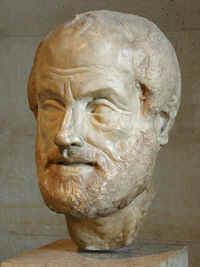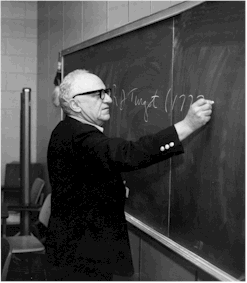Why Libertarians Should Be Concerned with the History of Political Thought

By Gene Callahan
The standard libertarian solution to how people best can achieve the obvious benefits of mutual cooperation whilst maintaining respect for the dignity and autonomy of the individuals comprising any social group possesses the virtue of being the readily comprehensible consequence of accepting a small number[1] of intuitively appealing principles. However, what proponents regard as admirably simple readily can appear simplistic if libertarian apologists display little awareness of the location of their ideas within the great currents running through the history of European political thought, a history incorporating much profound contemplation of human nature and social reality.
If prominent proponents of libertarianism appear to be ignorant of the great themes of Western political theory, then its opponents can plausibly dismiss libertarianism as another naïve attempt to deal with the complexity of political life with a set of simplistic slogans. That may not matter in terms of motivating those who are already libertarians, but for anyone attempting to broaden the appeal of libertarianism, and especially for those addressing academic political theorists, it is a significant problem.
To illustrate my point, I will present a handful of topics from the history of political thought that, it seems to me, are relevant for libertarian theorists. My sample is far from exhaustive, and I make no claim that I have not overlooked examples of significantly greater importance than those I address. Nevertheless, I believe that the cases I have chosen are sufficient to demonstrate that the problem I am noting here is not merely hypothetical.

Aristotle believed the essence of political action is rational persuasion
The Greek Polis
The ancient Greek understanding of the ideal character of life in a polis, particularly as it was articulated by Aristotle, presents a challenge to the common libertarian view of politics. To many libertarians, politics is the domain of force and coercion, contrasting sharply with the voluntary character of market interactions. However, as Aristotle saw it, the essence of political action is rational persuasion, and, as such, politics is the ultimate realization of the ideal of human freedom. Furthermore, there is an inherent equality between all political participants, in the sense that politics as persuasion excludes relationships such as lord and vassal. As Oakeshott writes: “For example, where political activity is understood to be an activity of persuasion, it assumes or entails a certin sort of egalitarianism. It is only ‘equals’ whom you try to ‘persuade.’ Command implies ‘unequals,’ subordinates” (2006, p. 95) .
What was the Greek solution in cases where persuasion ultimately failed? Their preference was for divorce rather than force, so that the loser in the dispute exited from the polis. Thus, the independent Greek cities present us with a form of social organization that includes features we commonly associate with the existence of a state—for instance, the presence of a territorially monopolistic legal authority—and yet, at least prima facie, the ideal polis largely is not subject to the chief anarchist objection to statism. After all, free people certainly cannot be compelled to continue an association they prefer to end. I say largely because libertarians are unlikely to condone the uncompensated and involuntary loss of house and land suffered by the ostracized party. However, the institutional adjustments that would be necessary to fully align such a polity with libertarian principles are not radical; for instance, an anarchist polis could require that, before joining the group, any prospective member must sign a covenant by which he or she explicitly accepts the possibility of ostracism, and there might be a provision allowing an exile to sell the fixed property he must leave behind at the best price he can find.
A notable aspect of the Greek conception of political life is that it runs counter to a common libertarian view that sees politics as akin to a deleterious tumor that has unfortunately invaded the social body and is sapping its health. If we define “politics,” as the Greeks did, to be the rational dialogue by which the members of a society strive to resolve their disagreements about which rules ought to regulate their interactions with each other, then politics must be an integral aspect of even the most libertarian of polities. A stateless society organized around the belief that property rights are inviolable still will require a means to reach broad consensus as to what conditions confer ownership of a good to a particular individual, how property can be justly acquired, and what sort of things are rights violations worthy of redress. I do not believe that these questions can be decided “automatically,” as the deductive consequences of some small set of first principles, because they are inextricably linked with matters of social custom and expectations about what sort of conduct is suitable in particular typified situations. For example, it would be excruciatingly tedious to try to explicitly specify every detail of what a restaurant patron is entitled to expect when ordering a meal. In most cultures there are numerous, almost always unstated, things that a restaurant is expected to provide in addition to the dishes listed on its menu, such as plates, silverware, chairs, napkins, and sufficient time at the table to finish the food, none of which are deductively necessary corollaries of its only explicit offer, which is to sell customers food. For example, in a country where people usually eat with their hands, such as Ethiopia, customers should not feel short-changed if silverware is not available at some eatery. On the other hand, in every country in which I have dined out, if a patron ordered a meal and then, upon being served, was informed that the price listed on the menu for his dishes only covered their preparation, delivery to the table, and a brief opportunity to wolf the food down, and that there was a significant charge for taking longer than a minute to eat, he’d rightly feel cheated. But there is no inherent rights violation here – if that unusual arrangement was made clear to every potential customer as they came in the front door, or if it was customary in some society, it would be a perfectly libertarian state of affairs.
Or consider pollution: the typical libertarian solution to the problem it presents is to regard polluters as property-rights violators. That is fine as far as it goes, but what level of pollution constitutes a violation? If my neighbor can smell my backyard barbecue and is put off by the scent of seared flesh, is he entitled to compensation from me? That seems absurd, but where should the line be drawn between that case and one where I commence a smelting operation on my land that continually chokes my neighbor’s family with noxious fumes. I do not see any way to answer such a question by turning to a priori ethical principles; once again, I think the expectations set by custom are a necessary component in any sensible resolutions of such disputes.
Machiavelli
Somewhat paradoxically, Machiavelli is widely understood to be the most misunderstood of the great figures of political theory. He is usually regarded, by those casually familiar with his ideas, as an unscrupulous advocate of the pursuit of power, by whatever means necessary, for its own sake. It probably will come as a shock to anyone who has accepted the popular image of Machiavelli to learn that he was a staunch republican, a believer in the rule of law, an advocate of citizen militias, and a fierce supporter of Italian liberty.

Machiavelli -- fierce supporter of Italian liberty
The apparently unbridgeable gap separating the scheming, tyrant-aiding rogue that many readers of The Prince picture as its author, and the freedom-loving theorist who composed the Discorsi, can be closed by understanding Machiavelli in his context. Machiavelli saw that the independence of the Italian city-states, which he believed to be the only polities keeping alive the ancient vision that the pinnacle of human achievement was for men to live in harmony as equal, free members of a justly governed society, was in grave danger of being destroyed by “barbarians” from beyond the Alps. The autocratic and decidedly un-republican kings of France and Spain both had hankerings to seize the wealth and cultural treasures of Italy for the greater glory of their own dominions. Furthermore, he believed that there was faint hope that Italy, as things then stood, would not fall to one or the other of its would-be masters. Not only were the Italian states dwarfed by the foreign powers longing to absorb them, their relations with each other were characterized by mistrust and internecine bickering. Furthermore, Machiavelli’s own Florentine Republic could not even present a consistent approach towards foreign affairs to other states, as each of the frequent changes of leadership called for by its constitution could, and often did, result in the new administration abandoning its predecessor’s foreign policy, and adopting a new course it saw as far more sensible. While any or even all of those directions might have worked for Florence on its own, the outcome of veering first towards one, then towards another, then reversing course, and so on, was that foreign powers came to see the republic as a fickle international actor, unreliable as an ally and a meaningless signatory to a treaty.
Machiavelli decided that the best chance for the survival of Italian independence was for Italy, temporarily, to adopt the style of statecraft that had brought the French and Spanish barbarians so much success. Until the invaders were driven away, Italy needed to be united by a strongman, a prince who would let no scruples or traditional constraints to his power stand in the way of preserving and strengthening his domain. Although acceding to the rule of such a man ran counter to Machiavelli’s passionate belief that the full realization of human nature required living in freedom as a citizen of a republic, he saw it as the only feasible alternative to total Italian submission to either the French or Spanish monarchy.
Once we understand Machiavelli’s view of the situation he and his country faced, I think it is clear that his work provides a stark depiction of a crucial conundrum that any serious libertarian theorist must try to solve. It is doubtlessly a suitable undertaking for a libertarian theorist to contemplate and expound on the characteristics of an ideal libertarian polity, operating under conditions where it is at peace with its neighbors, and where the very survival of its members is not constantly threatened. However, if that society is suddenly confronted by imminent aggression by an extremely powerful enemy, is it acceptable to set aside any libertarian principles if that abeyance will help prevent the far greater loss of liberty that would follow military defeat? (Contending that a fully libertarian society represents the optimal social arrangement for providing defense avoids rather than answers that question. Unless it can be demonstrated that it is impossible that there ever could arise any situation in which any deviation from libertarian principles might improve the odds of successful national defense, then the question as it stands calls for an answer.) Let’s imagine that there is a hill at the entrance to the polity’s chief harbor the occupation of which is indispensable to the defense of the harbor. However, the owner of the hill refuses to allow its defensive use. Is it necessary to sacrifice the liberty of all of the polity’s citizens, including that of the property owner, in the interest of libertarian purity? If one rejects that absolutism, then just what are the limits as to what a society can require of its members? And how are they to be set? Do the limits change with the gravity of the threat? If not, then why not? (After all, the initial departure from full libertarianism was justified by the gravity of the situation.)

Hobbes - firm believer in limited government
Hobbes and Harrington
At first glance Hobbes may appear to be one of the major political thinkers least congenial to libertarians. For Hobbes, the crucial social issue was the maintenance of peace and civil order. In his “state of nature,” each man has the “natural liberty” to advance any of his own ends and to eliminate whatever obstacle another human raises to achieving those ends in any way possible. The result, per Hobbes, is the “war of all against all,” rendering life “nasty, brutish, and short.” The desirability of social peace is so great that any rational person ought to sign away his natural liberty to a single sovereign power charged with safeguarding the social order and authoritatively resolving interpersonal conflicts.
Perhaps as the result of living through the English Civil War, Hobbes saw the end of preserving social order as so important that the sovereign was justified in taking any action to that end. For instance, Hobbes found it obvious that the state should enforce a single religion on its subjects, since religious disagreement had been such a potent source of civil conflict.
However, both the political philosopher Michael Oakeshott, and the historian of political thought J.G.A. Pocock, have noted that Hobbes actually forwards a limited view of the proper role of the state. While the state is justified in doing whatever is necessary to secure peaceful social relationships among its subjects, that is all it is justified in doing. Hobbes never entertains the notion that the state might offer a vehicle for perfecting the human condition. Governmental efforts to reduce subjects’ cholesterol levels or increase their appreciation of opera would appear absurd distractions from the state’s essential task, which is difficult enough all by itself. As Oakeshott put it, Hobbes is not a totalitarian because he is an authoritarian.
On the other hand, Hobbes’ contemporary James Harrington, the author of Oceana, with his advocacy of limited, Republican government, initially seems more admirable from the point of view of libertarianism. However, Harrington’s vision of a republic as a necessary condition for its citizens’ realization of the truly virtuous life, which arises from the millenialist element present in his thought, suggests that there is no aspect of social affairs that is inherently illegitimate as the subject of governmental interest. The “proto-liberal” Harrington turns out to be a forefather of the modern nanny state, while the “authoritarian” Hobbes offers a strong case for rejecting government-directed social engineering.
Federalists and Anti-Federalists
The period from the end of the American Revolution in 1783 and the ratification of the new US Constitution in 1788 saw a fierce debate between Federalists, who argued for a stronger central government, and Anti-Federalists, who viewed their opponents’ designs as a scheme to reverse the advances in liberty that had been won through war and sacrifice. As in our previous example, it initially seems clear where the sympathies of modern libertarians ought to lie: The libertarian “heroes” of this episode are the “wary of centralized power” Anti-Federalists, a position embraced energetically by, for example, Murray Rothbard. But, once again, a more informed view of the situation muddies the waters. In fact, a prime motivation for the program of many Federalists was the frequency with which the relatively autonomous, radically populist state legislatures used their power to advance distinctly un-libertarian agendas, particularly the gross violations of the property rights of wealthy individuals through which demagogues sought to bribe the newly empowered masses. The Federalists were strongly influenced by the classical political theories of Aristotle and Polybius, who held that the complete dominance of any one segment of the social order—the “one” (unalloyed monarchy), “the few” (unalloyed aristocracy), or “the many” (unalloyed democracy)—intrinsically would corrupt the dominant faction and lead it to use the state for the personal ends of the faction’s members rather than the common good. And that was precisely the process they saw unfolding in the unrestrained democracy embodied by the state legislatures. Their idea was that national political institutions would be less amenable to the influence of local interests, and therefore could act as a check on the tendency of state legislatures to become beholden to locally powerful lobbies. (They obviously had not imagined K Street!) While it is undoubtedly true that there were Federalists chiefly motivated by their desire to control the reins of the more powerful federal government they advocated, there were also others who embraced the proposed, new constitution on the quite libertarian ground that it would serve to protect the rights of individuals from populist violation.

Murray Rothbard -- a Libertarian who supported Anti-Federalists
The tension existing between a libertarian presumption in favor of local governance and the fact that, in numerous concrete situations, local bodies actually may be less respectful of the liberty of particular individuals than is some higher level of authority, appears again in the context of the American Civil War. Notably, most Rothbardians have vocally endorsed the justice of the South’s seccession, citing the right of individuals, and consequently groups of individuals, to self-governance. Their case is not without merit, but its advocates tend to ignore the fact that one of the bones of contention was precisely that the slave population of the South was being denied not only the right to self-governance, but pretty much all of the other liberties enjoyed by those slaves’ owners and their owners’ supporters, liberties which they valued enough for themselves that they were willing to go to war rather than surrender them. And the issue has new relevance with the increasing importance of the EU in European politics, and devolution in the UK. Ought libertarians to applaud the creation of the Scottish and Welsh legislatures as representing the reduction of centralized state power, or denigrate them for providing a means for the political classes of those Labour-dominated nations to enact more interventionist legislation than they could in the UK as a whole? Are EU measures to dismantle trade barriers between member states an objectionable violation of national sovereignty or a laudable defense of an individual’s right to trade with whomever he wishes?
References
Hoppe, Hans-Hermann (1988) “Utilitarians and Randians vs Reason,” Liberty (November): 53–54.
Oakeshott, Michael (2006) Lectures in the History of Political Thought, ed. Terry Nardin and Luke O’Sullivan, Exeter: Imprint Academic.
[1] A limiting case of this characteristic of libertarian thought is presented by Hoppe’s claim that the whole libertarian programme is a logically necessary conclusion of a single fact, namely, that people engage in rational debates about social arrangements. (See Hoppe, 1988.)
![]()
 Top 50 books of all time : by Old Hickory:-
Top 50 books of all time : by Old Hickory:-
"I have limited the selection to the books I have read. I keep to the norm of not recommending to others books I have yet to read. Clearly, books I have not read by now suggests a judgement of some sort."
PDF version
of this page
hopt.pdf
Download
Requires Adobe Acrobat Reader. This is available
for free at www.adobe.com
and on many free CDs.
